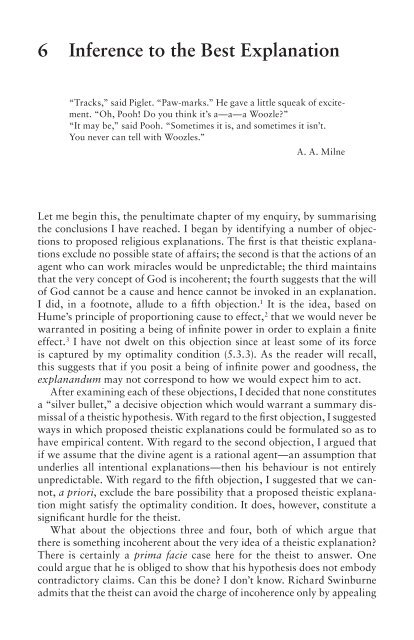Theism and Explanation - Appeared-to-Blogly
Theism and Explanation - Appeared-to-Blogly
Theism and Explanation - Appeared-to-Blogly
You also want an ePaper? Increase the reach of your titles
YUMPU automatically turns print PDFs into web optimized ePapers that Google loves.
6 Inference <strong>to</strong> the Best <strong>Explanation</strong><br />
“Tracks,” said Piglet. “Paw-marks.” He gave a little squeak of excitement.<br />
“Oh, Pooh! Do you think it’s a—a—a Woozle?”<br />
“It may be,” said Pooh. “Sometimes it is, <strong>and</strong> sometimes it isn’t.<br />
You never can tell with Woozles.”<br />
A. A. Milne<br />
Let me begin this, the penultimate chapter of my enquiry, by summarising<br />
the conclusions I have reached. I began by identifying a number of objections<br />
<strong>to</strong> proposed religious explanations. The fi rst is that theistic explanations<br />
exclude no possible state of affairs; the second is that the actions of an<br />
agent who can work miracles would be unpredictable; the third maintains<br />
that the very concept of God is incoherent; the fourth suggests that the will<br />
of God cannot be a cause <strong>and</strong> hence cannot be invoked in an explanation.<br />
I did, in a footnote, allude <strong>to</strong> a fi fth objection. 1 It is the idea, based on<br />
Hume’s principle of proportioning cause <strong>to</strong> effect, 2 that we would never be<br />
warranted in positing a being of infi nite power in order <strong>to</strong> explain a fi nite<br />
effect. 3 I have not dwelt on this objection since at least some of its force<br />
is captured by my optimality condition (5.3.3). As the reader will recall,<br />
this suggests that if you posit a being of infi nite power <strong>and</strong> goodness, the<br />
explan<strong>and</strong>um may not correspond <strong>to</strong> how we would expect him <strong>to</strong> act.<br />
After examining each of these objections, I decided that none constitutes<br />
a “silver bullet,” a decisive objection which would warrant a summary dismissal<br />
of a theistic hypothesis. With regard <strong>to</strong> the fi rst objection, I suggested<br />
ways in which proposed theistic explanations could be formulated so as <strong>to</strong><br />
have empirical content. With regard <strong>to</strong> the second objection, I argued that<br />
if we assume that the divine agent is a rational agent—an assumption that<br />
underlies all intentional explanations—then his behaviour is not entirely<br />
unpredictable. With regard <strong>to</strong> the fi fth objection, I suggested that we cannot,<br />
a priori, exclude the bare possibility that a proposed theistic explanation<br />
might satisfy the optimality condition. It does, however, constitute a<br />
signifi cant hurdle for the theist.<br />
What about the objections three <strong>and</strong> four, both of which argue that<br />
there is something incoherent about the very idea of a theistic explanation?<br />
There is certainly a prima facie case here for the theist <strong>to</strong> answer. One<br />
could argue that he is obliged <strong>to</strong> show that his hypothesis does not embody<br />
contradic<strong>to</strong>ry claims. Can this be done? I don’t know. Richard Swinburne<br />
admits that the theist can avoid the charge of incoherence only by appealing



